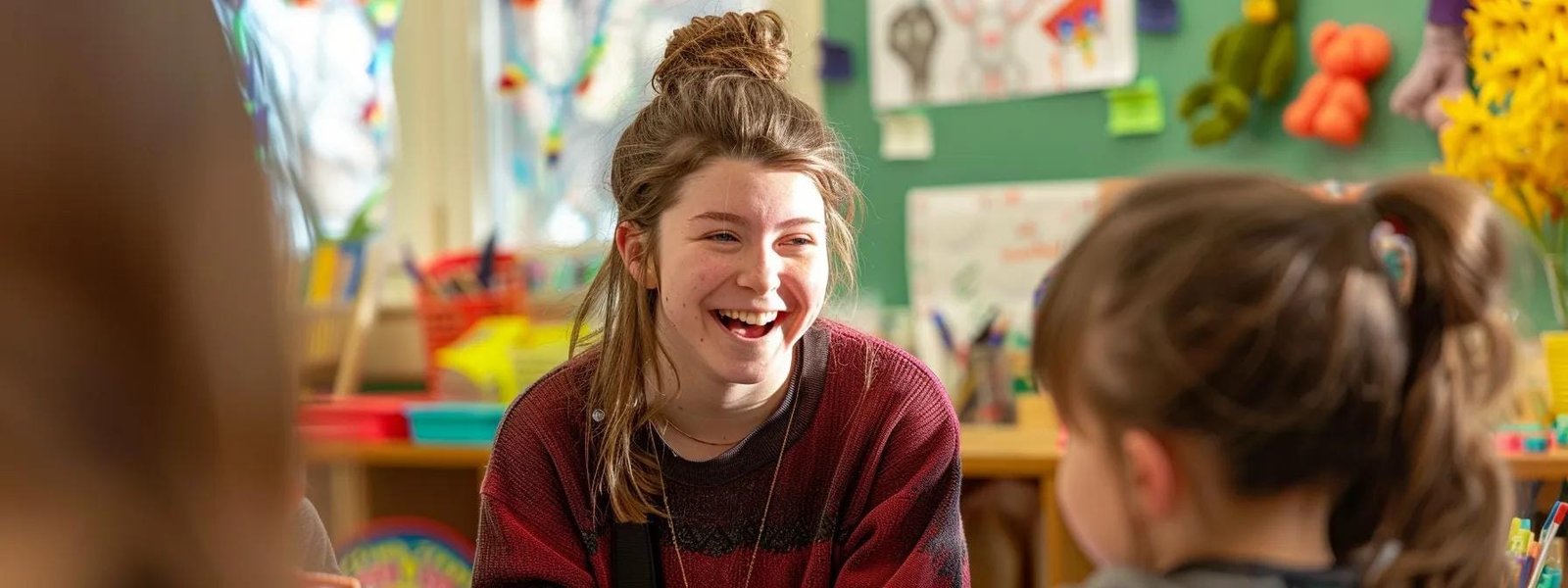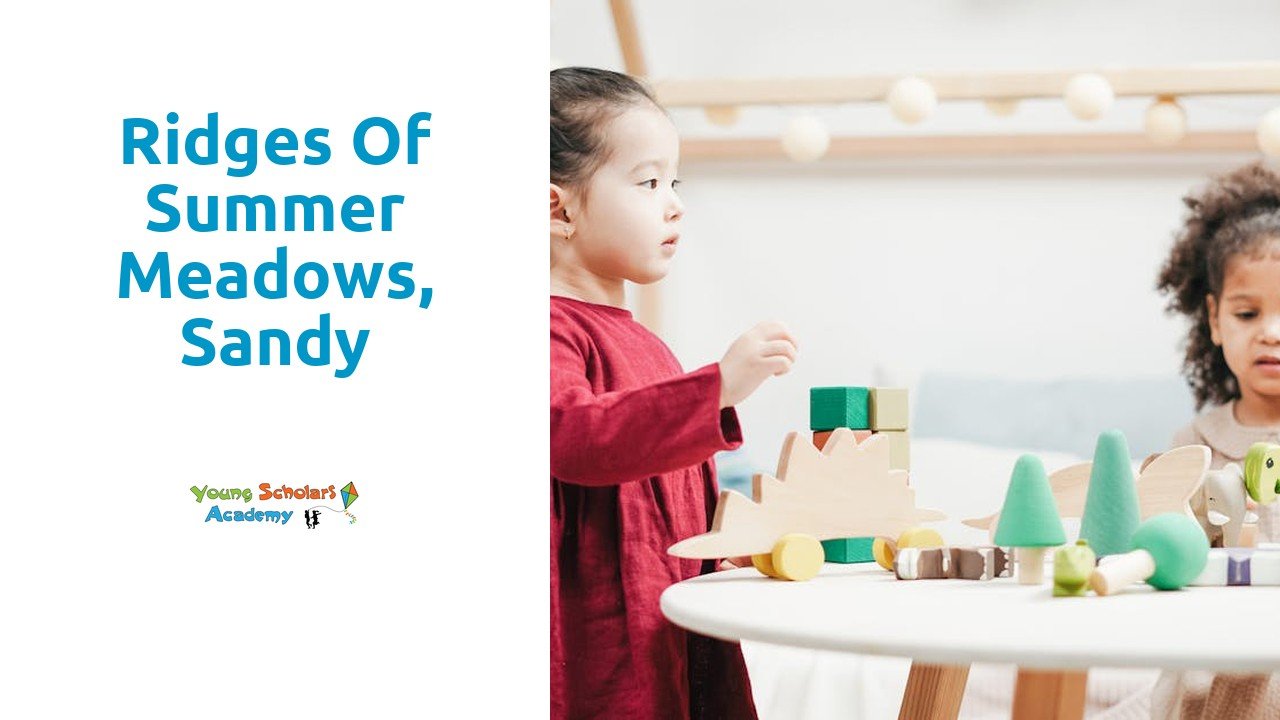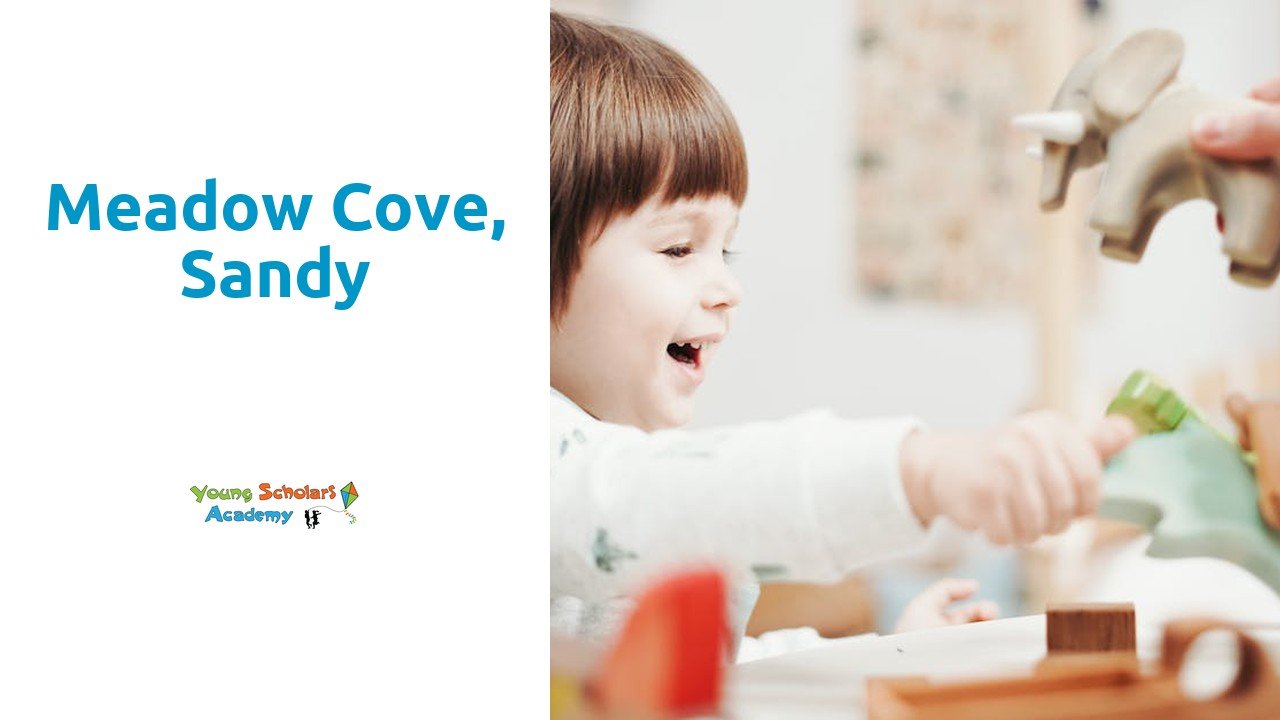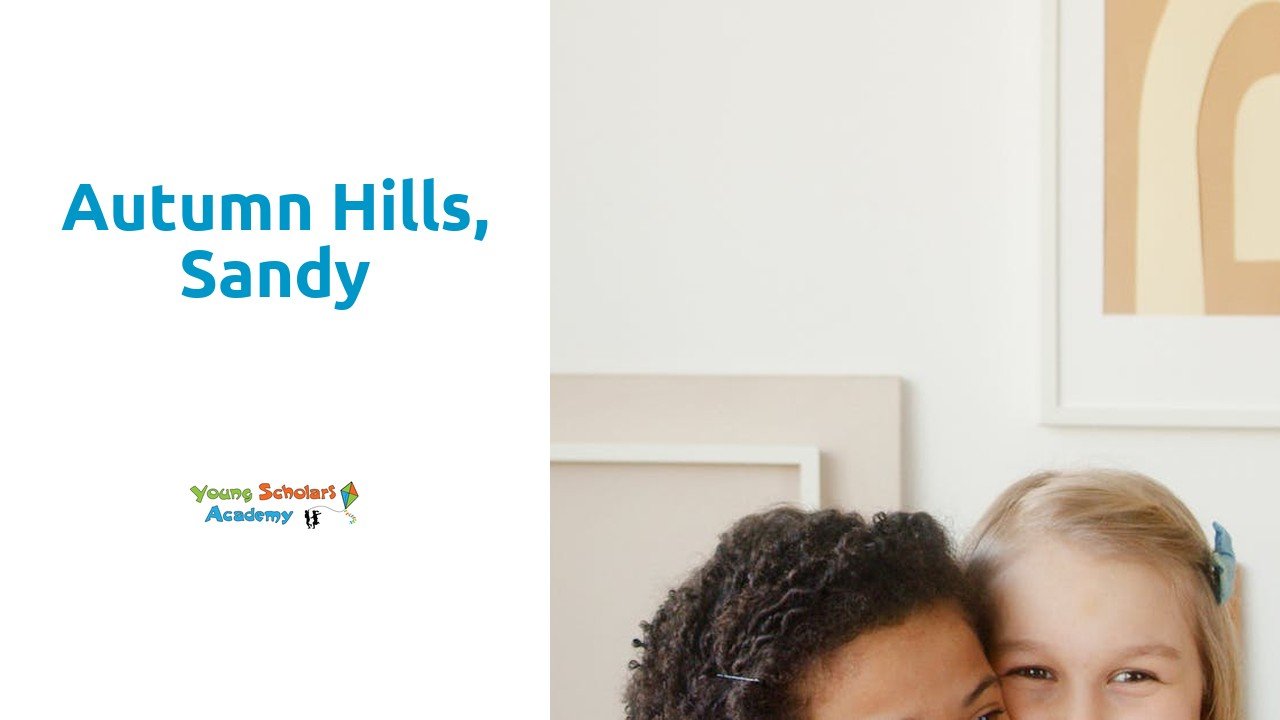When choosing a preschool for your child in Draper, UT, you might wonder what qualifications and experience preschool teachers have. Knowing the right credentials can make a big difference in your child’s early learning journey. This article will dive into the necessary qualifications for preschool teachers, their levels of experience, and the importance of ongoing professional development. By the end, you’ll understand how these factors contribute to creating a nurturing daycare environment and the impact they have on your child’s growth. Let’s get started on ensuring your little one receives the best early education!
Qualifications Required for Preschool Teachers in Draper, UT
To ensure quality early childhood education at schools in the Salt Lake Valley, preschool teachers must meet specific qualifications. This includes having an appropriate educational background and certifications, complying with licensing requirements, and undergoing a thorough background check. Specialized training in early childhood education further prepares teachers to promote kindergarten readiness for infants and young children.
Educational Background and Certifications
When I think about the qualifications of preschool teachers in Draper, UT, the educational background and relevant certifications definitely stand out. Many teachers need a degree in early childhood education or a related field to ensure they have a solid foundation for developing effective curriculums. Having this knowledge allows them to create engaging activities, even incorporating cooking projects that enhance children’s learning experiences. This approach not only makes education fun but also helps prepare kids for a smoother transition to kindergarten.
Certifications play a critical role in establishing the expertise of preschool teachers as well. Some may pursue additional training in areas like computer science to integrate technology into their lessons, which is becoming increasingly important in today’s world. These qualifications help teachers meet employment standards and provide them with the skills needed to support the growth of young learners effectively, both academically and emotionally. Parents can rest assured knowing that teachers are equipped with the right tools to help their children thrive.
State Licensing Requirements
In Utah, specific state licensing requirements ensure that preschool teachers are well-equipped to foster early childhood development. Each educator must obtain a Child Development Associate (CDA) credential or a degree in early childhood education. This credentialing process guarantees teachers have the knowledge needed to nurture young learners’ social skills and prepare them for kindergarten. By meeting these standards, teachers can create enriching environments that promote both academic success and personal growth.
Alongside academic backgrounds, ongoing professional development is essential for preschool teachers in Draper. They are often required to complete continuing education courses, which may include training in physical education, child development, and classroom management techniques. This ongoing education helps teachers stay current with the best practices in early childhood education, allowing them to effectively support children’s diverse needs. Parents can feel confident knowing that their children are guided by licensed professionals who are dedicated to creating a positive learning experience.
Specialized Training in Early Childhood Education
Specialized training in early childhood education is essential for preschool teachers in Draper, and it covers a range of topics, including child development and best practices in child care. For instance, many educators learn how to handle diaper changing effectively and hygienically, ensuring that kids are comfortable during their learning experience. This hands-on training makes a significant difference in how teachers engage with children, allowing them to address the specifics of early learning and create a nurturing environment.
Moreover, this training often includes understanding statistics related to child development milestones. With this knowledge, teachers can better assess each child’s progress and tailor their approach to meet individual needs. As a parent, knowing that a teacher has specialized training gives me confidence that my child is not only cared for but is also receiving a quality education that prepares them for the future.
Experience Levels of Preschool Teachers in Draper, UT
In Draper, UT, the experience levels of preschool teachers vary significantly. Entry-level expectations revolve around foundational skills in child development and problem solving, often seen in candidates who may have experience as a nanny or in other child-focused roles. The importance of classroom experience can’t be understated, as it equips teachers with hands-on knowledge essential for managing a preschool environment.
As teachers gain advanced experience, many take on leadership roles, guiding younger educators and contributing to curriculum development. They bring practical insights into physics and creative learning approaches, ensuring kids get a well-rounded education. This section will cover all these aspects, providing a closer look at the journey of preschool teachers in Draper, UT.
Entry-Level Expectations and Opportunities
When I think about starting out in a preschool environment, I remember how important foundational skills were for entry-level teachers. Many of us begin our journeys with roles like nannying or assisting in early education settings, which helps us gain practical experience. It’s a great way to develop essential skills such as classroom management and communication, especially in a bilingual education setting where we might need to engage with children learning in both English and Spanish. This hands-on experience really sets the tone for growth and future leadership opportunities.
As I gained confidence in my craft, I learned that taking on tutoring roles or helping out with special projects can open doors to advancement. These opportunities not only allow entry-level teachers to enhance their resumes but also improve their understanding of diverse learning styles. By showcasing our skills through real-life application, we prepare ourselves for more significant responsibilities down the line, creating a positive impact on young learners and their families.
Importance of Classroom Experience
Classroom experience plays a vital role in shaping effective preschool teachers in Draper, UT. When I’ve had the chance to work in various educational settings, such as summer camp or during my internship, I noticed how real-world interactions with children enhance my understanding of their behaviors and needs. Those hands-on opportunities allow me to learn how to manage different situations, ensuring a nurturing environment where kids feel safe and engaged.
Moreover, classroom experience equips educators with the skills needed to assist children’s transitions into elementary school. I found that figuring out proper communication styles, especially in bilingual settings, came more naturally after being in a classroom. This practical knowledge helps address any challenges that arise, giving parents peace of mind that their children are in capable hands as they grow and learn.
Advanced Experience and Leadership Roles
As teachers gain advanced experience, many are inclined to take on leadership roles that help shape the preschool environment in Draper. I’ve seen firsthand how experienced educators can lead field trips that spark curiosity in children—like research projects that explore nature or local history. These opportunities promote hands-on learning and encourage kids to think critically about their surroundings.
Furthermore, experienced teachers often collaborate with local universities, like the University of Texas at Austin, to incorporate best practices in early childhood education. This connection allows them to stay updated on the latest research and strategies, which they then apply in their classrooms. As a result, children benefit from a curriculum that is rich in exploration and engagement, preparing them well for their future educational journeys.
Ongoing Professional Development for Preschool Educators
Workshops and training programs are key for preschool educators like me. They help us integrate new teaching techniques, such as incorporating mathematics education into our daily lessons. Plus, continuing education keeps us updated on topics like first aid and managing parental leave effectively. These opportunities not only spark curiosity in our teaching but also enhance the learning experiences we provide to our students.
Workshops and Training Programs
Workshops and training programs are essential for us as preschool educators in the Salt Lake City area. They provide an opportunity to refine our skills and learn new strategies that enhance children’s cognition. For instance, attending a workshop on dual enrollment can help us understand how to incorporate advanced concepts into our lessons, making learning more engaging for young minds.
I’ve found that connecting with local institutions to participate in these training events boosts our confidence and effectiveness in the classroom. Programs focused on family engagement, such as FSA (Family Support Activities), allow us to strengthen the bond between home and school, ensuring that we’re all on the same page when supporting our young learners’ journeys.
Integrating New Teaching Techniques
Integrating new teaching techniques is a vital part of my role as a preschool educator in Draper, UT. I often look for ways to boost my confidence and effectiveness in the classroom, especially when it comes to student aid. For instance, embracing hands-on activities that align with the latest educational acts helps foster a more engaging learning environment. These techniques ensure that children not only grasp concepts but also enjoy the process of learning, making the child care center a fun place to grow.
One practical example I’ve experienced is incorporating technology into my lessons. Using interactive apps and games helps me introduce subjects like math and literacy in ways that resonate with young learners. This approach not only captures their attention but also allows me to monitor their progress more effectively. I feel that integrating these new teaching methods elevates our curriculum and supports the overall development of children at our child care center.
Benefits of Continuing Education
Continuing education is incredibly beneficial for preschool educators like me, especially in terms of enhancing our learning environment. By taking extra courses in subjects like biology and child development, I notice that we can apply scientific concepts in our curriculum, which enriches the educational experience for our young learners. This additional knowledge not only supports the academic growth of children but also empowers us as teachers to foster curiosity and critical thinking in the classroom.
Moreover, many of us in Utah have access to financial aid options for our undergraduate studies, making it easier to pursue further education. This support allows us to attend workshops or advanced degree programs that equip us with the latest teaching techniques and strategies. Embracing these opportunities significantly improves our effectiveness and confidence, ultimately benefiting the children we teach and their transition into kindergarten.
The Role of Early Childhood Education Credentials
Essential certifications in early childhood education, including various degree programs, play a crucial role in shaping the quality of preschool instruction. I’ve seen how accreditation impacts teaching effectiveness, especially in subjects like mathematics. Credentials not only enhance a teacher’s skills but also open doors for federal student aid, supporting ongoing professional growth and development. Let’s explore how these factors come together to elevate the teaching experience.
Essential Certifications for Teaching
When it comes to essential certifications for teaching preschool in Draper, UT, I’ve found that having the right credentials can make a big difference in my effectiveness as an educator. For instance, certifications help guide my approach to integrating critical thinking into daily lessons, making subjects like social studies more engaging for young minds. With a solid foundation in these areas, I can create activities that not only captivate children but also lay the groundwork for their future learning.
In my experience, pursuing additional training in areas such as nursing can also enhance my ability to support the health and wellbeing of my students. For example, understanding nutritious meal planning not only promotes healthy eating habits but also contributes to the overall development of children. By actively applying these skills in the classroom, I feel more prepared to nurture children’s learning journeys while addressing their diverse needs.
Importance of Accreditation
Accreditation is a significant factor in enhancing the quality of preschool education for caregivers like me. When I attended the University of Texas at Dallas, I quickly learned that having accredited training means I can provide structured lessons that include everything from creativity exercises to the basics of subjects like calculus, helping children build a strong academic foundation. Parents often feel more secure knowing that their child’s education is overseen by professionals who have met rigorous standards in their training and development.
Moreover, accreditation opens up access to valuable resources and ongoing educational opportunities. This means I can stay updated on best practices and innovations in early childhood education, making my teaching more effective. For instance, I can attend workshops that teach new techniques or creative activities that engage children’s curiosity. These tools not only make it easier for me to assist young learners with their homework but also empower me to shape a nurturing environment where every child can thrive as they prepare for their educational journey.
How Credentials Impact Teaching Quality
Having strong credentials in early childhood education significantly boosts teaching quality. From my experience, when preschool teachers possess degrees and certifications, they bring a wealth of knowledge that directly benefits children’s literacy and emotional development. For instance, with a solid foundation in early action education strategies, I’ve seen how such qualifications empower us to create engaging lessons that suit each child’s learning style, making education more effective and enjoyable.
Moreover, credentials also open doors to ongoing training and resources, which enhances our teaching methods. I often connect what I learn in workshops to my classroom activities, using innovative techniques to promote literacy skills among children. This practical application not only enriches their learning environment but also ensures they’re better prepared for future academic challenges. Knowing I can tap into a broader pool of knowledge makes me feel more confident in guiding young learners on their educational journey.
Teacher Qualifications and Student Outcomes
When I think about the connection between teacher qualifications and student outcomes, several key factors come to mind. Evidence shows that experienced educators significantly enhance student success, as their skills and insights shape the learning environment. Effective preschool teachers exhibit qualities like patience and creativity, while parents often perceive their child’s progress as a reflection of teacher credentials. Let’s unpack these aspects in detail.
Evidence Linking Experience to Student Success
From my own experience, I’ve noticed a clear link between the qualifications of preschool teachers and the success of their students. When teachers have a solid background in early childhood education, they’re better equipped to create engaging and effective learning environments. For example, I’ve seen children flourish academically and emotionally when supported by educators who truly understand child development milestones.
Moreover, experienced teachers often bring valuable insights gained from years of hands-on practice, which can dramatically enhance a child’s readiness for kindergarten. Through my time in various classrooms, I’ve observed that kids with experienced teachers tend to show better social skills and a greater eagerness to learn. This not only benefits their current learning but also sets a strong foundation for their future education.
Qualities of Effective Preschool Educators
When I think about what makes an effective preschool educator, patience and creativity really stand out. These qualities create a supportive environment where kids feel comfortable expressing themselves. I’ve seen how teachers who take the time to understand each child’s unique needs can tailor their approach to learning, which boosts children’s overall engagement and success.
Another essential quality is strong communication skills. Teachers who can effectively connect with both children and parents help to build a sense of community that enhances the learning experience. I’ve noticed that when educators regularly share progress and challenges with parents, it not only fosters trust but also encourages collaboration in a child’s educational journey, leading to better outcomes for everyone involved.
Parent Perceptions and Teacher Credentials
When I talk to other parents in Draper, I often hear concerns about how teacher credentials impact their children’s education. It’s clear that many of us are looking for reassurance that our little ones are in the hands of qualified educators. Personally, I feel more at ease knowing that preschool teachers possess the right degrees and certifications because it reflects their commitment to fostering a supportive learning environment. This assurance goes a long way in building trust between parents and teachers, which ultimately benefits our children.
I’ve found that when parents see teachers engaging in ongoing professional development and further training, it reinforces our confidence in their abilities. For instance, I’ve noticed that teachers who participate in workshops or training programs tend to bring fresh ideas and innovative techniques to the classroom. This not only enhances the learning experience but also helps us as parents feel more involved in our child’s educational journey. Knowing my child’s teacher is dedicated to continuous improvement makes me feel confident that they will receive the high-quality education they deserve.
Resources for Parents Evaluating Preschool Teachers
When searching for the right preschool for your child, it’s essential to understand teaching qualifications and how to assess a teacher’s experience. Knowing what credentials to look for can help you feel confident in your decision. I’ll guide you through the important questions to ask when choosing a preschool, ensuring you have all the information you need to make the best choice for your child’s education.
Understanding Teaching Qualifications
When I evaluate preschool teachers, understanding their teaching qualifications really matters. It’s important to look for educators who have a degree in early childhood education or relevant certifications. This background not only shows they have the knowledge to support child development but also assures me that they can create engaging activities that make learning enjoyable for my little one.
Another aspect I consider is whether the teachers participate in ongoing professional development. I appreciate when educators attend workshops or training sessions because it indicates they’re committed to improving their skills and staying updated on the latest teaching methods. Seeing this dedication ensures me that my child will be nurtured by someone who truly values and invests in their own growth, ultimately benefiting our whole family.
How to Assess Teacher Experience
When I look at a preschool teacher’s experience, I always consider their hands-on background in early childhood environments. It’s helpful to ask about their previous roles, like whether they’ve worked in various settings such as daycare centers, summer camps, or even as a nanny. This type of shared experience gives me insight into how well they interact with children and manage different situations, which is important for fostering a positive learning atmosphere.
I also find it useful to talk to the teacher about any leadership roles they’ve held or special projects they’ve led. For example, if they’ve taken part in curriculum development or led field trips, that shows they’re not just involved in daily activities but are also committed to enriching children’s experiences. This kind of insight reassures me that I’m choosing a teacher who actively shapes their educational approach and is equipped to guide my child’s growth.
Questions to Ask When Choosing a Preschool
When I was looking for the right preschool, I found it helpful to ask teachers about their qualifications and experience directly. Questions like, “What degrees or certifications do you hold?” give me insight into their educational background. I also like to know how long they’ve been working with young children and what specific teaching methods they use to foster learning, especially in a bilingual setting.
Another important question I ask is about ongoing training and professional development. Inquiring if they attend workshops or conferences shows me that they are committed to staying updated on early childhood education best practices. This dedication not only impacts their teaching style but also reflects how engaged they’ll be in nurturing my child’s growth and development throughout their preschool journey.
Conclusion
The qualifications and experience of preschool teachers in Draper, UT, play a significant role in shaping the educational experiences of young learners. Well-trained educators with the right certifications foster engaging, enriching environments that promote both academic and social growth. As parents, understanding these qualifications allows us to make informed decisions about our children’s early education. Ultimately, investing in experienced and knowledgeable teachers ensures that our children receive the nurturing support they need for a successful start in their educational journey.






